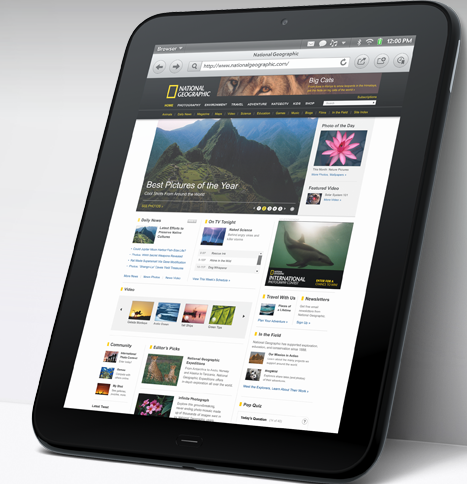HP's TouchPad tablet, smartphones put WebOS back into the game

Hewlett Packard put its best foot forward today with an update to the mobile webOS platform that it inherited in the acquisition of Palm. At an event in San Francisco, the company introduced three new products - two smartphones and a new tablet PC that drew applause from the audience at the event.
Gallery: HP reveals 9.7-inch TouchPad tablets
Called HP Touchpad, the tablet PC - at least initially - looks like a strong contender in what's about to be a crowded industry. Maybe it's seamless synchronization with webOS smartphones or the powerful dual core 1.2 GHz Snapdragon processor. Perhaps it's the use of Flash - something that Apple's iPhone and iPad don't support.
See Gallery: HP's 9.7-inch TouchPad tablet
But, like the early use of this OS in the original Palm Pre and Pixi smartphones, the overall OS experience is what comes across as most impressive, designed with the user - whether a consumer or business customer - in mind.
How else do you explain a touch-screen keyboard that can be sized from small to large, depending on the user's comfort level? Finally, a tablet PC touchscreen keyboard that adapts so that users like me - people who create a lot of original content - can type on the screen as if it were an actual keyboard.
And let's not forget about the "Just type" bar, a blank bar that brings up the keyboard and then asks what the user wants to do with the words: Search? Send to Google? Post to Twitter (via a third party add-on app.) Regardless, it's giving users the option - and that makes it worth noting.
What was especially impressive was the ability to use the Touchpad as a phone. The front-facing camera makes video calling possible - but what was a "Wow Moment" was how a regular phone call could be turned into a video call with a single click, as demonstrated on-stage.
In terms of some of the specs - we're looking at a weight of 1.6 pounds, a thickness of just over 13 mm and a 9.7-inch display. It will come in two versions - a 16 GB model and 32 GB model. More: Techmeme, HP statements on TouchPad, Veer, Pre3.
Though the tablet stole the show, there were also two smartphones - the Veer and the Pre3, both positioned as friendly to consumers and business users. The devices looked nice, utilizing the same form factor as the original Pre phones, including a slideout keyboard in the portrait mode, making the phone vertically longer and easier to navigate and type on.
Senior VP and General Manager Jon Rubenstein called the tablet device "nothing short of a breakthrough" and I'd say he's right on the money with that comment. The tablet space is heating up and certainly the company to beat at this moment is Apple and its iPad. Sure, Google and Motorola are kicking up the heat with the forthcoming launch of the Xoom, the first tablet to run on Android 3 OS. And we're still waiting to see how RIM's Playbook will fit into the market.
While I haven't had a chance to play with a TouchPad to see if it's really as fast as HP is touting and if the integration with other webOS devices - which, by the way, was pretty impressive - is as seamless as they say, I'm convinced that HP went above and beyond to make something powerful and competitive enough to jump into the main stage arena with Apple and Google.
The devices themselves won't be available until later this year - so the landscape can certainly change between now and then. And with excitement bubbling up over with buzz that the iPad2 is now in production, HP's marketing team will need to kick into high gear to make sure the Touchpad stays front of mind. Update: At the beginning of the event, the company said this was just the beginning - and at the tail end of the event, it said that, later this year, webOS will be integrated into personal computers, as well.
The Veer will be out in the early Spring and the Pre3, as well as the TouchPad won't be out until the summer. The company didn't provide any details on carrier partners, nor did it make any mention of pricing - which will certainly be key to its success.
A WiFi-only version of the TouchPad will be launched first, in the U.S. and "select markets worldwide" this summer and will be followed by 3G- and 4G-enabled versions shortly after. Again, no mention of carrier partner, so it's unclear whose 4G network will power it.
Amidst all the noise about tablets these days, it appears that HP - which is no longer using the Palm label - has found a way to rise above the chatter and develop something that really keeps the user, as well as everyday uses, in mind.
See also:
